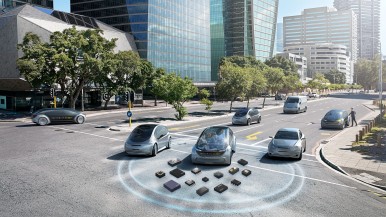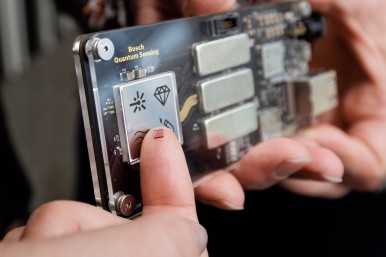- Bosch’s Mobility Solutions business sector performed well in a difficult market environment in China in 2018. Sales rose to 10.5 billion euros, accounting for a 1 percent increase year on year1 and roughly 22 percent of Bosch Mobility Solutions’ global sales. As a result, China is the most important foreign market for Bosch’s Mobility Solutions business sector.
- Bosch maintains 38 manufacturing sites in China, with 23 plants making products for Mobility Solutions. The business sector’s largest manufacturing site is in Suzhou, where 9,800 associates produce ABS and ESP systems, as well as display instruments, to name just a few examples.
- Of the 27 Bosch research centers in China, 18 are working on new mobility solutions.
- In China, Bosch employs some 60,000 associates in total – its largest workforce outside Germany. Roughly 34,500 associates work for Bosch Mobility Solutions in China, or 15 percent of all the business sector’s associates. In addition, more than 5,600 researchers and engineers in China are working on new mobility solutions.
- In late March 2019, Bosch opened a new plant for the iBooster electromechanical brake booster in Nanjing. The company invested 100 million euros in the plant, which measures some 20,000 square meters.
- Mass production of the 48-volt battery began in Wuxi in 2018. Production of the e-axle is slated to start in Taicang this year.
- Bosch continues to expect good opportunities and tremendous potential for its Mobility Solutions business sector in China in the medium to long term. The Chinese automotive market is far from being saturated, with roughly 170 vehicles for every 1,000 inhabitants. In Germany, that figure stands at approximately 690 vehicles per 1,000 inhabitants.
- Bosch is celebrating its 110th anniversary in China in 2019. Twenty-five years ago, Bosch also founded its first joint ventures with Chinese partners, making it a manufacturing company in China.
Facts about the automotive market in China
- Since 2009, the Chinese vehicle market has been the largest in the world – well ahead of Europe and the U.S.
- In 2018, 23.7 million cars were sold in China, along with 4.4 million light and heavy commercial vehicles (source: CAAM).
- In 2018, 1.26 million new energy vehicles (NEVs) – battery-powered electric vehicles, plug-in hybrids, and fuel-cell cars – were sold in China, representing an increase of more than 50 percent year on year and 5.3 percent of the overall market (source: CAAM).
- Of the 20 largest brands in China, domestic manufacturers accounted for 39 percent of all cars sold in 2018. European manufacturers accounted for 31 percent, with 14 percent going to Japanese brands, 11 percent to U.S. brands, and 5 percent to Korean makers.
- At 477,000 units, the best-selling car in China in 2018 was the family van Wuling Hongguang made by SGMW – a joint venture between SAIC Motor, General Motors, and Liuzhou Wuling Motors.
- Most people in China spend between 50,000 and 150,000 Chinese yuan (6,500 to 20,000 euros) on a new car. In Germany, car buyers invest an average of over 30,000 euros in a new vehicle.
- At roughly 50 percent of the total market, SUVs and vans were the most popular vehicle segment in China in 2018, followed in second place by mid-sized vehicles, which accounted for a share of approximately 29 percent (source: CAAM).
Quotes by Bosch management board member Dr. Stefan Hartung:
“Today, China is the center of the global automotive industry. The Chinese automotive market is evolving into a lead market for modern mobility in which Bosch plans to play an important role.”
“The brakes will stay on in the Chinese automotive market this year. After two decades of constant growth, the market is taking time out in 2019. Still, the potential and the opportunities for Bosch in China remain tremendous in the medium to long term.”
“The future of mobility needs inventors, not slowpokes. China is producing more and more inventors, and Bosch is in high demand as a strong partner.”
“China’s automakers have gone from baby steps to seven-league strides in a remarkably short time. Soon they will no longer be mere onlookers in the global market.”
“Bosch is at home in Germany. It also has deep roots in China – having been there for 110 years.”





